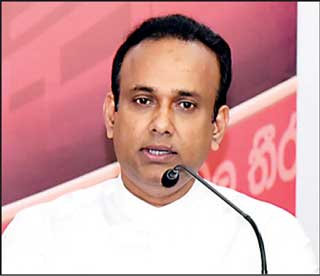Tuesday Feb 17, 2026
Tuesday Feb 17, 2026
Wednesday, 2 February 2022 00:00 - - {{hitsCtrl.values.hits}}
By Charumini de Silva
The Government is to go for fresh negotiations to secure power from the private sector on the instructions of President Gotabaya Rajapaksa for want of better terms.
 |
| Cabinet Co-Spokesman Dr. Ramesh Pathirana |
The proposal for sourcing from the private sector by Power Minister Gamini Lokuge came under heavy debate at the Cabinet of Ministers meeting yesterday, prompting the President to issue a new directive.
“The proposal submitted by the Power Minister for IPPs was taken up at the Cabinet briefing, but the President ordered a fresh approach. However, it was agreed in principle to purchase power given the energy crisis,” Cabinet Co-Spokesman and Plantation Industries Minister Dr. Ramesh Pathirana said at the post-Cabinet Meeting media briefing yesterday.
The move was sought to bridge any power capacity deficiency that might arise as the dry season is just around the corner.
Dr. Pathirana said that the President Rajapaksa disagreed with the condition imposed by an Independent Power Producer (IPP) for a three-year agreement with the CEB and ordered the Power Minister to call for competitive bids. Previously CEB has had Power Purchase Agreement (PPA) with the IPP for five years on a regular extension basis with the last expiring in 2021.“The President insisted that the Government is keen on companies that are willing to supply electricity as and when there is a need and, not on a long-term basis,” Pathirana explained.
Non-availability of new mainstream power plants in the past seven years, slow growth and implementation of renewable energy and severe financial crisis in the post-COVID era has contributed to the energy crisis that Sri Lanka is facing at present, the Minister outlined.
He said the demand for electricity has increased by over 10% per annum, but there were no new power plants established.
The oil-fired plants are very expensive and a trend that the world is moving out from, he pointed out that top officials in the power sector are also opposing any new investments in the sector, including renewable energy plants.
Sri Lanka is faced with an energy crisis, as the country is heavily relying on thermal power plants at present with part of the Norochcholai coal power plant crashed yesterday again, while the Government is grappling to source funds amidst an escalating foreign exchange crisis.
When asked how the private oil-fired plants source diesel, the Minister said they too purchase from the quantities that Ceylon Petroleum Corporation (CPC) imports. “Long-term practice of the oil-fired plants will hamper both State and private sector power plants,” he added.